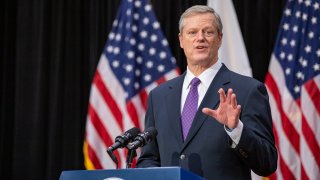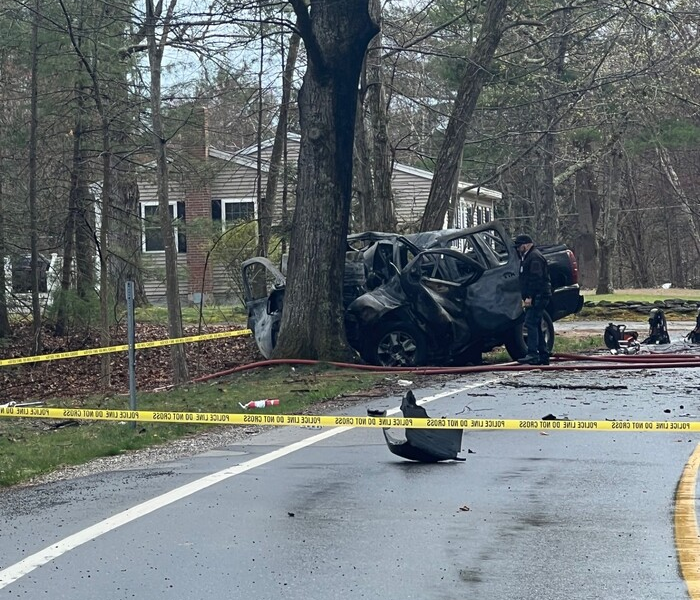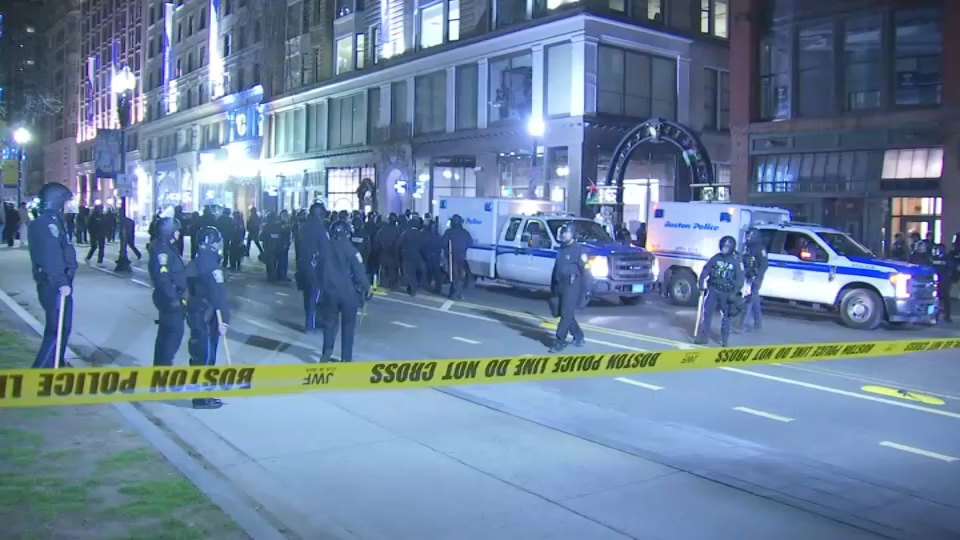
Fees on ride-hailing services such as Uber and Lyft will not increase in Massachusetts after Gov. Charlie Baker vetoed a new proposed fee structure while signing a $16.5 billion transportation bond bill on Friday.
Baker gave his approval to almost all of the multi-year spending authorizations, but rejected several major transportation policy proposals that the Legislature packed into the wide-ranging bill.
He shot down proposed hikes on transportation network companies, or TNCs, that would have replaced the current 20-cent flat fee per ride with a higher set of fees as well as a new legislative mandate requiring the MBTA to offer a low-income fare program.
In a letter alongside his signature, Baker said the Legislature's proposed fees for transportation network companies were "complicated" and based on pre-pandemic assumptions about travel patterns.
"Before instituting fees that are aimed at incentivizing certain travel behaviors, we need to understand what ridership and congestion patterns are going to look like after the pandemic," Baker wrote, adding that he would refile provisions aimed at collecting more data from the services.
Lawmakers approved the bill (H 5248) in the dying hours of the 2019-2020 lawmaking session -- after private Democrat-led negotiations on it lasted for more than five months -- and in doing so left themselves no room to attempt to override Baker's now-final vetoes.
The legislation will drive investment in road and bridge maintenance, help fund major projects such as a South Coast Rail expansion and the Green Line Extension, and replenish the state's transportation bonding authority ahead of the upcoming construction season.
Local
Major capital outlays in the bill include $3 billion for "transit system modernization," an umbrella category covering MBTA bus and Green Line upgrades, electrification of sections of the Fairmount and Stoughton commuter rail lines, and extending the Blue Line to the Charles/MGH Station on the Red Line.
Another $825 million will go toward the South Coast Rail expansion project adding commuter rail service in Taunton, New Bedford and Fall River. The under-construction Green Line Extension into Somerville and Medford would get $595 million.
On the roadway side, the bill authorizes $350 million in bonds to improve the roadway approaches and related infrastructure near the Bourne and Sagamore bridges connecting to Cape Cod.
A $1.25 billion Next-Generation Bridge Program will "dramatically accelerate the Commonwealth's bridge investments," Baker wrote.
"This legislation is vital to allowing MassDOT and the MBTA to commence planning on the next Capital Investment Plan, and to continuing this administration's thoughtful and data driven approach to rebuilding, modernizing, and expanding the capacity of the Commonwealth's transportation system," Baker said.
Alongside his signatures and vetoes on the bond bill, Baker rejected another bill (H 5185) that would require the MBTA to use federal funding to restore spending on capital projects and reverse a package of service cuts its board approved in December.
The T, which Baker's administration oversees, plans to keep most of the cuts in place for at least the next few months despite getting an injection of at least $250 million from the latest federal stimulus package. Agency officials opted instead to revive some paused capital projects and set a chunk of money aside to help restore service at a later, still-uncertain date.
Baker has defended the service cuts, arguing that it is "bad public policy" for the MBTA to keep running trains and buses on pre-pandemic schedules with only a quarter to a third of riders.
"I agree that the MBTA should evaluate and deploy additional funding that becomes available, including federal funding, to support sufficient base service levels and -- when ridership and revenue so justify -- begin to restore service that has been reduced and capital projects that have been delayed," Baker wrote in a separate letter. "The amended language sent back by the legislature, however, does not give the Fiscal Management and Control Board the latitude it needs to decide on how and when to deploy federal funds."
Baker also vetoed several other policy sections of the bond bill, including a proposed commission to study congestion pricing systems that use varying roadway tolls to influence traffic and a line item outlining requirements for a major multimodal capital project in Allston.
One section he rejected would have required all proceeds from the Transportation and Climate Initiative, a multi-state compact to reduce carbon emissions, to be deposited into the Commonwealth Transportation Fund. Baker said he wanted some of the funding instead to go toward "flexible emissions reductions and equity investments."
Baker also shot down language in the bill instructing the state's 15 regional transit authorities to study means-tested fares and requiring the MBTA to launch a low-income fare program, a topic that the agency has been studying but has not yet fully implemented.
"More study is needed to understand how transit authorities can implement fare systems that depend on gathering information about riders' incomes and to understand what the revenue loss would be and how that revenue would be replaced," Baker wrote. "No means-tested fares can be implemented until the MBTA and RTAs have a financially sustainable plan in place to replace the lost revenue."
He did give his support to several other policies that Democrats in the Legislature touted as significant achievements, including language that decriminalizes public transit fare evasion and a provision enforcing parking bans in dedicated bus lanes.
Baker kicked off debate about the bond bill a year and a half ago, in a pre-COVID world, with an $18 billion proposal. But the pandemic changed travel patterns across the state, decimating ridership on public transit and pushing millions of workers into remote operations.
The public health crisis also reshaped the political landscape for transportation debate. In March, the House approved a wide-ranging package of tax and fee increases aimed at generating more than half a billion dollars for the transportation sector, but the Senate never took up the proposal and allowed it to die, with leaders arguing that it did not fit during the economic downturn.
House and Senate Democrats appeared poised to revive at least one revenue-generating proposal with their last-minute inclusion of the new TNC fee structure in the bond bill. The compromise legislation that emerged from a conference committee in the final hours of session called for raising the 20 cent flat fee for every ride to 40 cents for a shared ride, $1.20 for a non-shared ride and $2.20 for a luxury ride.
The Metropolitan Area Planning Commission estimated that the new model could haul in $56.2 million in annual revenue even if ridership on platforms like Uber and Lyft remained at only half of 2019 levels.
Last year, Baker proposed increasing TNC fees, but only to $1 per ride rather than the scaled and higher structure the Legislature offered.



